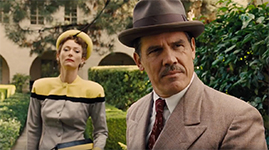Hail, Caesar!
|  Hail, Caesar! is Joel and Ethan Coen’s first out-and-out comedy in nearly a decade (the last being 2008’s goofy espionage farce Burn After Reading), and on its face it should be a home run, especially for those who appreciate the Coens’ offbeat sense of black humor, dexterity with overwrought language, and love of reworking classical Hollywood genres to their own eccentric ends. However, the film never quite comes together, as if the Coens had a bunch of potentially funny ideas about the absurdity of the classical Hollywood studio system and couldn’t figure out a way to effectively string them together. Granted, far-flung, meandering stories with multiple subplots are part of the Coens’ cinematic language (how else to support the huge casts their films consistently draw?), and when they do it well, it works against all odds (see, for example, 1998’s The Big Lebowski). However, Hail, Caesar! feels even more scattershot then usual, which means that the laughs that don’t hit feel like particularly hollow thuds and the ones that do are simply a relief. Hail, Caesar! is Joel and Ethan Coen’s first out-and-out comedy in nearly a decade (the last being 2008’s goofy espionage farce Burn After Reading), and on its face it should be a home run, especially for those who appreciate the Coens’ offbeat sense of black humor, dexterity with overwrought language, and love of reworking classical Hollywood genres to their own eccentric ends. However, the film never quite comes together, as if the Coens had a bunch of potentially funny ideas about the absurdity of the classical Hollywood studio system and couldn’t figure out a way to effectively string them together. Granted, far-flung, meandering stories with multiple subplots are part of the Coens’ cinematic language (how else to support the huge casts their films consistently draw?), and when they do it well, it works against all odds (see, for example, 1998’s The Big Lebowski). However, Hail, Caesar! feels even more scattershot then usual, which means that the laughs that don’t hit feel like particularly hollow thuds and the ones that do are simply a relief.The story is set in 1951 against the backdrop of the fictional Capitol Pictures. The various subplots are more or less held together by Eddie Mannix (Josh Brolin), the studio’s no-nonsense head of production who spends most of his time putting out fires (the very first scene finds him wrenching one of the studio’s newest starlets away from the home of a cheesecake photographer at 5:00 in the morning). A devout Catholic and family man who is entertaining a very lucrative offer for an executive position at Lockheed, Mannix is a serious man in a not-so-serious movie, which means he exists primarily to offer straight-man services (both visually and morally) to buttress the wackiness around him. Mannix is a man of action, but the Coens clearly want us to see him as a man of principles, as well, even if those principles often have to be twisted to justify the requirements of his occupation. In a 24-hour period, Mannix must deal with any number of issues, including the impossible casting of Hobie Doyle (Alden Ehrenreich), an aw-shucks singing cowboy, in a mannered chamber drama directed by the pretentious Brit Laurence Laurentz (Ralph Fiennes); the out-of-wedlock pregnancy of DeeAnna Moran (Scarlett Johansson), the studio’s Esther Williams-esque aquamusical star; and the constant swirling of competing gossip writers Thora and Thessaly Thacker (both played by Tilda Swinton), who become especially persistent when Baird Whitlock (George Clooney), the studio’s biggest above-the-title star and headliner of their opulent Biblical production Hail, Caesar!: A Story of the Christ, suddenly goes missing. Mannix knows what has happened—Whitlock has been kidnapped by a group calling themselves “The Future” and demanding a $100,000 ransom—but he needs to keep that out of the papers, lest it cause a scandal. Interwoven through all of that is a secondary rogue’s gallery of characters, including Channing Tatum’s song-and-dance star Burt Gurney, Frances McDormand’s chain-smoking editor C.C. Calhoun, and Veronica Osorio’s smiley Carmen Miranda-esque Carlotta Valdez (shout-out to Vertigo?), who is set up with Hobie by the studio as his date for the premiere of his latest musical oater. Each of the film’s characters allows the Coens to play with a different subgenre that was popular in Eisenhower-era Hollywood—the sand-and-sandal epics, Westerns, musicals (waterlogged and otherwise), costume dramas—which they recreate in loving detail with favored cinematographer Roger Deakins. They also utilize the production techniques and special effects of the era throughout the film, so that when a giant submarine surfaces in the ocean just off the Southern California coast, it is clearly a mix of studio tank work and miniatures. The film’s tone and attitude, though, are thoroughly modern in Coens’ honey-and-vinegar mixing of admiration for the cinematic past and disdain for the industry’s excesses and hypocrisies. Their love of old movies runs headlong into the reactionary, obfuscating, greedy, morally bankrupt institutions that produced them, which gives the film its somewhat split personality. Mannix is crucial in this regard, as he plays a character with a reasonable head on his shoulders who nevertheless feels compelled to work in an industry that is both, by his standards, debased and just plan lunatic (he is either a masochist or is driven by impulses he doesn’t want to admit in the confessional booth each day). One of the film’s best scenes finds Mannix at a conference table with a Catholic priest, a rabbi, an evangelical minister, and a Greek Orthodox priest debating the merits of the Hail, Caesar! script’s depiction of Christ’s divinity and its potential to offend anyone; the scene features both the film’s best screwball wordplay (much better than Hobie’s endlessly befuddled attempts to say “Would that it t’were so simple”) and pointed jabs at Hollywood’s transparent desire to avoid offense not out of genuine concern for anyone’s religious beliefs, but to protect the bottom line. The film’s title is obviously drawn from the film-within-the-film, but it also suggests our relationship to Hollywood itself (the Caesar of the title), which demands groveling and honor without actually earning it. A long-winded subplot involving communist screenwriters certainly fits the time period (this is, after all, the era of McCarthyism and the blacklist), although it maybe hits the film’s real concerns with Hollywood’s stranglehold on our cultural imagination too squarely on the head. The idea that there really was a major communist infiltration of Hollywood in the ’50s is one of the film’s better conceits, although it feels like the Coens didn’t really know what to do with it beyond that (outside of finding a near-great means of stunt-casting Channing Tatum—take that, Quentin Tarantino). The film’s communists are sincere, ideological boobs who look good only because Hollywood, particularly as embodied by Clooney’s square-jawed, dim-witted Charlton Heston-esqe star, is so thoroughly shallow. The Coens don’t get as nasty as they did in Burn After Reading (nobody gets axed, for example, at least not literally), but it isn’t hard to feel the bile surging underneath the Technicolored, homage-heavy surface. The Coens clearly have something to say about Hollywood’s irresolvable dedication to art and commerce, but the uneven, shaggy-dog nature of the film’s scattershot comedy buries most of it. Copyright ©2016 James Kendrick Thoughts? E-mail James Kendrick All images copyright © Universal Pictures |
Overall Rating: 

 (2.5)
(2.5)


